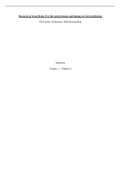Research at Grass Roots: For the social sciences and human services professions
CB Fouche, H Strydom, WJH Roestenburg
Summary
Chapter 1 – Chapter 8
, Chapter 1 – Research and Professional Practice
Chapter will discuss:
i. The philosophical foundations of professions
ii. The nature of professional practices
iii. Professional and research ethics
iv. The diversity of paradigms within professions
i. Philosophical Foundations of Professions
• Philosophy plays pivotal role in illuminating our thinking about many aspects of
human existence and therefore critical in guiding us in our chosen professions.
• Philosophy (Greek word “philosophia” – “the love of wisdom) is the study of how
knowledge, reality and our existence as human beings evoke questions about who we
are, what we know and how we experience the world around us.
• It is “the fundamental nature of knowledge, reality and existence” – Tartaglia
• Professions in relation to philosophy can be described as the love (pursuit) of
knowledge around professions.
• Philosophy becomes the vehicle (or school of thought) through which we interpret and
perceive what is around us; this in turn brings about paradigm.
• If philosophy can be regarded as a general worldview, then a paradigm is the
framework through which we make sense of that world.
• Paradigm establishes the boundaries of understanding and practice, along with
subsequent ethics that must accompany these boundaries.
• Many philosophies that describe the world in particular ways:
- Absolutism (philosophy of absolute power, such as is found in absolute
monarchies)
- Zoroastrianism (one of the oldest and continuously practices religions or
philosophies in the world, focusing on the notion of a balance between order and
chaos)
, - Underlying beliefs and principles of philosophies (such as the elements of the
philosophical paradigm) will inform the chosen approach and methodology the
researcher uses.
PARADIGM:
• Philosophy by nature is “multidisciplinary, interdisciplinary and transdisciplinary”
and underpinned by particular paradigm.
• Paradigm according to Thomas Kuhn denotes a certain way of doing something; an
example or pattern that establishes a “disciplinary matrix [or] the practices that define
a scientific discipline at a certain point in time”
• We will define paradigm as a construct that represents an archetype of how
professions achieve what they set out to do at a particular point in time.
• A paradigm prescribes what is acceptable within a community of practice or
profession.
• A paradigm prescribes what is acceptable within a community of practice or
profession.
• Paradigm description can change when practitioners within particular professions
deem it fit to change and this constitutes paradigm shift.
• Researchers must:
1. Which paradigm they will be working with.
2. Have a good grasp of the nature of selected paradigm.
3. Use paradigm to substantiate methodology and methods they select.
4. Articulate paradigm clearly in research proposal and/or report.
• Professions may embrace divergent paradigms depending on their nature, mission
statements and goals.
, • Paradigm to which a profession subscribes often informs the approach that will be
followed.
• Of three approaches at researchers’ disposal (quantitative, qualitative, and mixed
methods), the mixed methods approach is considered to be the most viable for
professional practice as it is placed within a pragmatic paradigm.
• A profession – relates to a calling, vocation, occupation, or career.
• Profession (profiteri) means to declare publicly – this public declaration aims at
informing those around us the parameters, processes, and requirements of the
profession, including relevant information that is to the benefit of society.
• Pragmatism is linked to Weberian Philosophy: underpins the methodology of
professions (based on work of German sociologist Max Weber).
• The philosophy focuses on the structure that shapes human action or agency.
• Weber’s discussion on bureaucracy propelled him to believe that there is a need to
train professional in service of humanity.
• Other philosophical approaches such as functionalism, interactionalism, Marxism and
Foucauldianism does not adequately classify the notion of professions for this
context.
• As Marxism influenced Weberianism, Weberianism has influenced neo-Weberianism.
• Neo-Weberianism is a “new” form of Weberianism that “that serves to ‘modernism’
or otherwise ‘improve the Weberian paradigm”
• Paradigms are informed by corresponding beliefs that help us understand how and
why paradigms are followed within a specific disciple or research practice.
• Representations of these basic beliefs or principles differ, however, are set out in the
corresponding ontology and epistemology of the paradigm.
• NB to note terminology is not used consistently by authors across the literature and
can be quite disorientating even for experienced researchers.
• Do not get caught up in concepts as much as the meaning at different conceptual
levels.
• All these terms represent distinct hierarchal levels of decision-making within the
research process.
• A researcher will hold certain views, professional and personally, about the world and
evidence within that might develop from religious, Indigenous, feminist, socialist or
capitalist beliefs and values.





